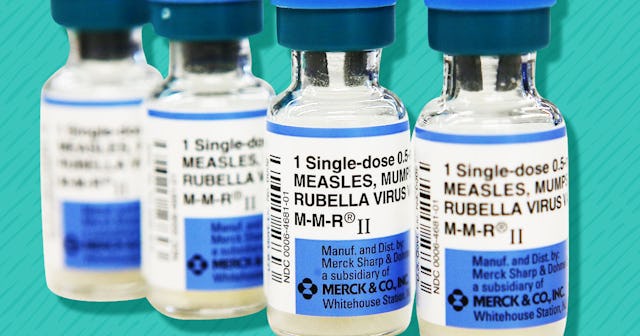People Born Before 1989 Might Not Be Fully Vaccinated Against Measles

If you were born before 1989, you may want to call your doctor about getting one more dose of the measles vaccine
Amid what’s now officially the worst measles outbreak since the disease was declared eradicated back in 2000, healthcare professionals are warning adults born before 1989 that they might not be as protected against the disease as they think.
The CDC recommend the measles vaccine for every American over a year old. It’s administered in two doses with the first dose providing around 93 percent chance of immunity. The second dose ups it to 97. Trouble is, even as recently as the 1980s, only one dose was given. That means a whole lot of us (slowly raises hand) are probably in need of a second dose of the vaccine.
The concern over whether adults are as protected as possible against the disease come as the story of an Israeli woman who had been vaccinated got the measles and slipped into a coma, according to CNN. She was reportedly healthy before contracting the illness. “She’s been in a deep coma for 10 days, and we’re now just hoping for the best,” says Dr. Itamar Grotto, associate director general of Israel’s Ministry of Health.
Dr. William Schaffner, an infectious disease specialist at Vanderbilt University and an adviser to the US Centers for Disease Control and Prevention on vaccines, says he knew an outbreak like this was imminent. “We have the reintroduction of a serious viral infection with a population that’s withholding the vaccine from their children, and now it’s spreading beyond that population,” he says.
Now that the number of confirmed measles cases is the highest it’s been in nearly two decades, the advice of doctors to consider getting another dose of measles vaccine is probably something we should listen to. After all, us parents are around our own children all the time — don’t we want to protect them along with the rest of the humans we come into contact with?
The current measles outbreak has caused the FDA to remind the public how safe and necessary the vaccine is. “We cannot state strongly enough – the overwhelming scientific evidence shows that vaccines are among the most effective and safest interventions to both prevent individual illness and protect public health,” wrote Dr. Peter Marks of the FDA. “Vaccinating against measles, mumps and rubella not only protects us and our children, it protects people who can’t be vaccinated, including children with compromised immune systems due to illness and its treatment, such as cancer.”
The thing is, measles isn’t some harmless childhood illness with no serious repercussions. According to the CDC, 1 out of every 1,000 children who gets measles will develop encephalitis, which can cause convulsions, loss of hearing, or even intellectual disabilities. Also, 1 or 2 U.S. children out of 1,000 infected will die from the disease. The rate globally is 1 or 2 out of 100 children.
With the stakes this high, it’s hard to understand why anyone would pass on vaccines if they’re in proper health to receive them. If you think you may be eligible and in need of a second dose of the measles vaccine contact your healthcare provider to have that discussion.
This article was originally published on